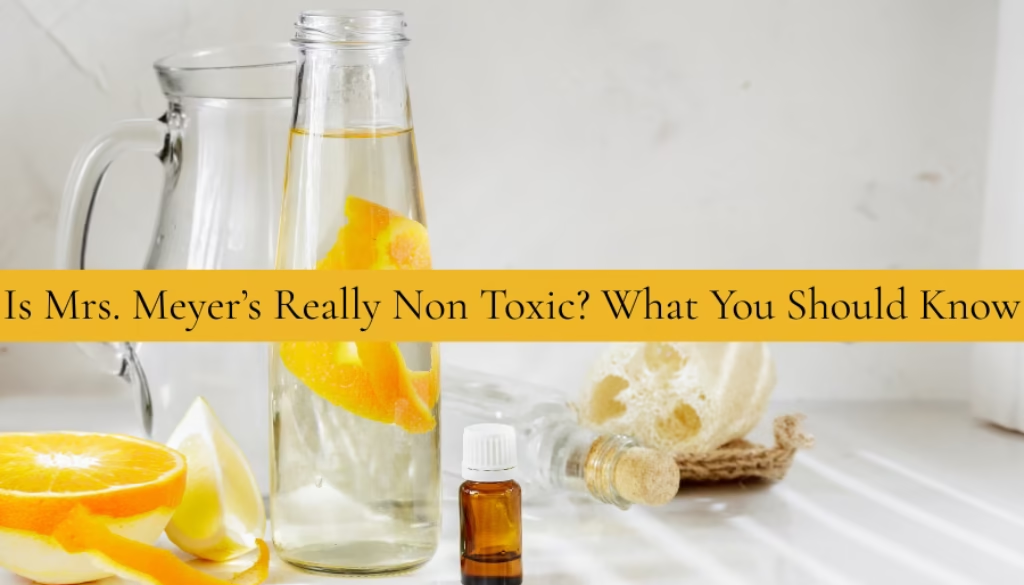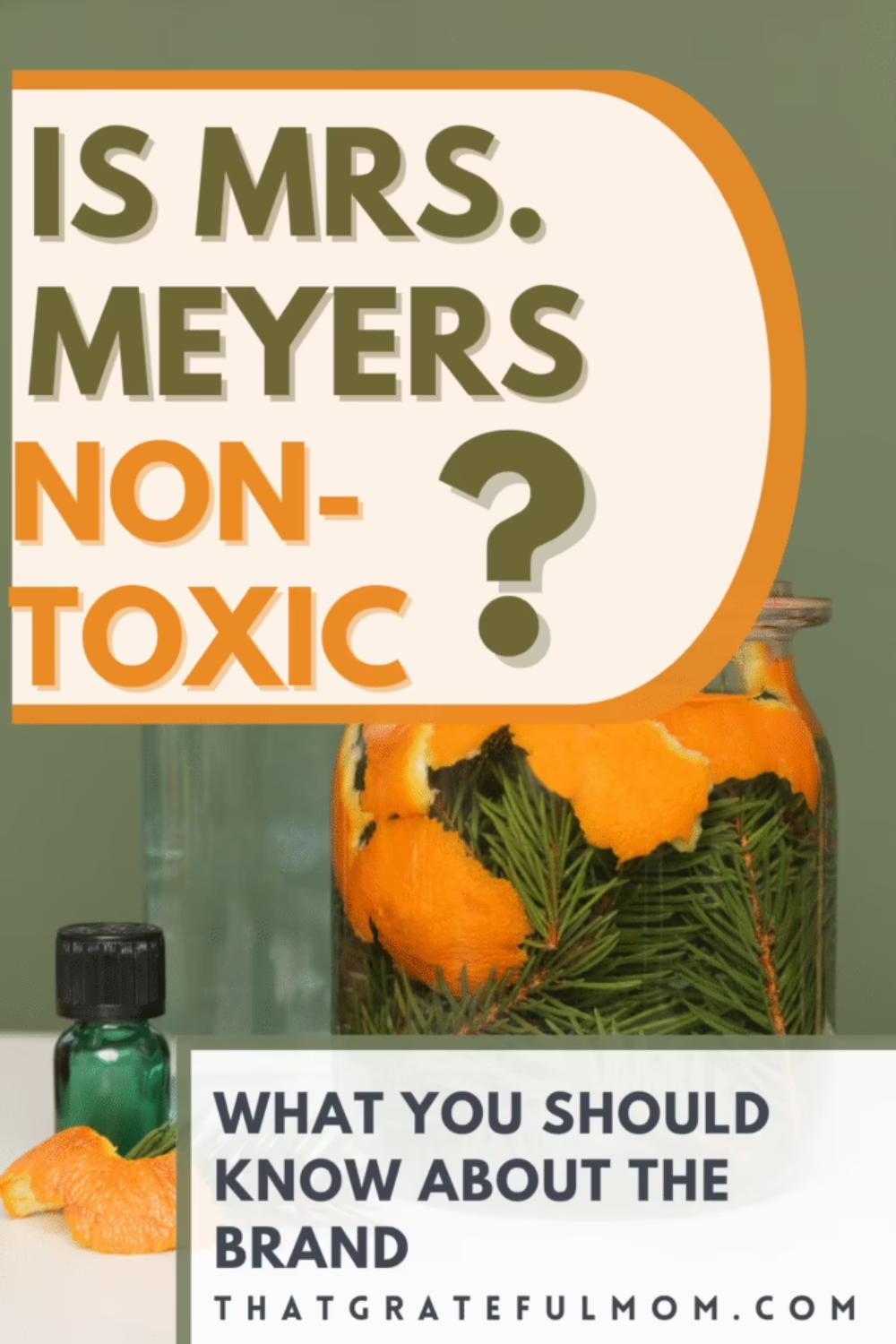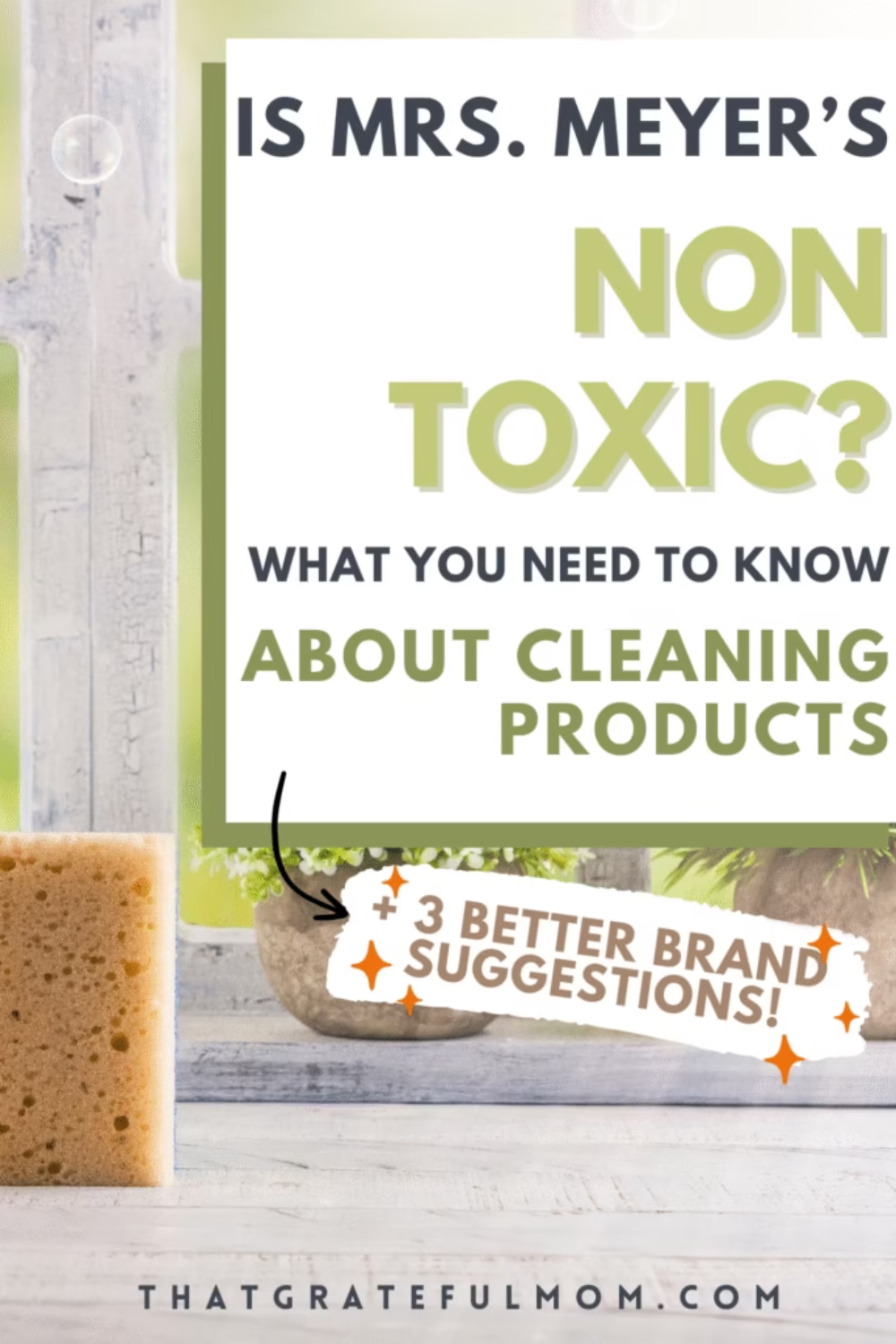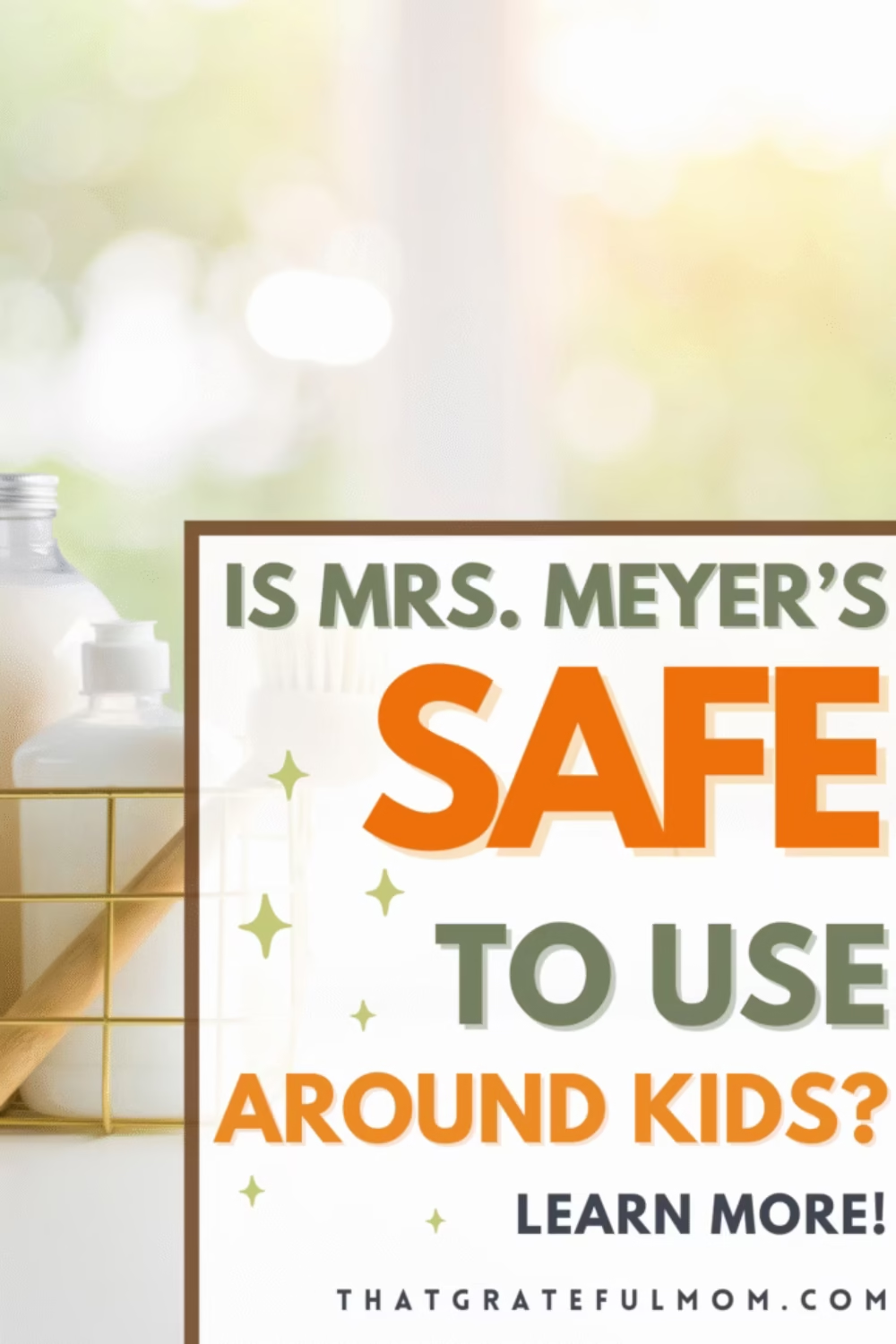Is Mrs. Meyer’s Really Non Toxic? What You Should Know
When I first started transitioning my home to safer, non-toxic cleaning products, Mrs. Meyer’s was one of the first brands I tried. The packaging felt wholesome, the scents were lovely, and the marketing promised plant-derived ingredients and essential oils. But after diving deeper into the ingredients and doing my own research, I started asking a bigger question: Is Mrs. Meyer’s really non toxic?
In this post, I’ll walk you through what I discovered, both the good and the questionable. If you’re someone who’s trying to reduce harmful chemicals in your home, especially around young children or pets, this breakdown will help you decide whether Mrs. Meyer’s products are the best option for your family.
What Draws People to Mrs. Meyer’s Products?
Mrs. Meyer’s has built a strong reputation as a natural cleaning brand. It’s marketed as cruelty-free, made with plant-based products, and filled with essential oils like lavender, lemon verbena, and basil. For people seeking a green alternative to traditional cleaning products, Mrs. Meyer’s seems like a perfect example of safer, more thoughtful home care.
Their product line includes:
-
Hand soap
-
Laundry detergent
-
Dish soap
-
Surface cleaner
-
Air fresheners
-
Personal care products
I personally loved how the bottle of Mrs. Meyer’s looked on my countertop. Their branding just feels clean and cheerful. And the fresh scent of their basil dish soap? It quickly became one of my favorite products. But looks and fragrance don’t always tell the full story.
Related post: The Best Non-Toxic Dish Soap
A Look at the Ingredient Labels
If you’ve ever flipped over the bottle of Mrs. Meyer’s soap, you might have noticed a few plant-derived ingredients, alongside others that are harder to pronounce. I started looking closely at the ingredient labels on Mrs. Meyer’s cleaning products and noticed several things that raised questions.
Here are a few ingredients commonly found in their products and what they mean:
-
Sodium lauryl sulfate (SLS) – A cleansing agent known to cause skin irritation for some people.
-
Fragrance ingredients – Listed vaguely as “fragrance” or “natural fragrance,” which can include undisclosed synthetic chemicals.
-
Citric acid – A common pH adjuster derived from citrus, generally considered safe.
-
Sodium citrate – A salt of citric acid, often used to balance formulas.
-
Tetrasodium glutamate diacetate – A synthetic chelating agent that can be a skin sensitizer in some cases.
-
Potassium sorbate – A preservative that helps prevent mold growth.
-
Decyl glucoside and lauryl glucoside – Mild surfactants from plants, typically gentle on skin.
While some of these are plant-based ingredients, others fall into a gray area between synthetic and naturally derived. What stood out most was the vague use of the term “fragrance,” which is not regulated by the FDA and can hide a cocktail of unknown substances, including potential endocrine disruptors and allergens.
Common Complaints and Health Concerns
Over the years, customers have shared a variety of experiences, both positive and negative. Some have reported allergic reactions, including rashes, hives, or breathing issues after using Mrs. Meyer’s products. Others note mild dry skin or irritation, especially when washing dishes or using the hand soap frequently.
From what I’ve seen in forums and social media groups focused on non-toxic living, it seems like a large majority of Mrs. Meyer’s fans aren’t reading too deeply into the ingredients. That’s not a judgment, this brand is popular for a reason. But once I started digging, I realized there were sorts of really terrible skin reactions being discussed that I hadn’t expected from a supposedly clean product.
Comparing to Truly Non-Toxic Brands
Once I began looking beyond marketing, I found safer options that offer the same plant-based cleaning power without as many questionable ingredients. Brands like Force of Nature, PapaBear Naturals, and Branch Basics clearly list all their ingredients, avoid synthetic fragrance, and steer clear of skin sensitizers like SLS or tetrasodium glutamate diacetate.
These brands also focus on environmental impact, something that’s been questioned with Mrs. Meyer’s as well. Ingredients like sodium benzoate, benzyl acetate, and synthetic fragrance are not great for aquatic life and may linger in the water supply. The Environmental Working Group (EWG) rates some Mrs. Meyer’s products moderately well, but not always in the “green” category many assume they belong to.
I also noticed that companies like Branch Basics and Force of Nature offer transparent alternatives for everything from laundry detergent to surface sprays. When I switched, I felt more confident about what I was spraying around my children.
Safer Alternatives to Consider
In addition to Pure Haven and Meliora, there are several standout brands that offer truly non-toxic solutions for cleaning your home without harsh chemicals or synthetic fragrance.
Force of Nature – This brand uses electricity to convert salt, water, and vinegar into a powerful EPA-registered disinfectant and deodorizer. It’s kid-safe, pet-safe, and completely free of synthetic fragrance or preservatives. I love that one small bottle replaces dozens of traditional cleaners, making it a low-waste and budget-friendly solution over time.
Save 40% on your first purchase by shopping through this link!
Papabear Naturals – This small-batch brand is ideal for families who want clean ingredients and honest labeling. Their surface sprays and laundry soap are free from all sulfates, phthalates, and preservatives, and they use essential oils like lemon, lavender, and eucalyptus. It’s a great option if you’re looking to support a smaller company while reducing exposure to repellent chemicals.
Save 10% on your entire purchase here!
Branch Basics – This concentrate-based system is one of my personal favorites. It’s fragrance-free, made with plant and mineral-based ingredients, and incredibly versatile. You can use it to clean everything from your counters to your laundry with just one simple formula. Their transparent ingredient list and customer education make them a great choice for beginners in non-toxic living.
Save 15% when shopping through this link!
These brands offer the kind of transparency and effectiveness that many popular “green” brands don’t always deliver. Whether you’re looking for a natural dish soap, a deet-free bug spray, or a surface cleaner you can feel good about using around your kids, these alternatives are worth exploring.
Who Owns Mrs. Meyer’s?
This is another eye-opening part of the story. While it started as an independent company inspired by a real woman named Mrs. Thelma Meyer, the brand was eventually acquired by S.C. Johnson, the same parent company that owns brands like Windex and Raid.
This shift led me to question how much of the original mission remained. While the Mrs. Meyer’s website continues to highlight plant-derived ingredients and healthy cleaning, the parent company doesn’t have the best track record for non-toxic or cruelty-free standards. For some people, like me, this is a deal-breaker.
So…Is Mrs. Meyer’s Really Non Toxic?
The answer depends on your definition of non-toxic. If you’re the kind of person who simply wants to avoid the worst chemicals, like bleach, ammonia, or known carcinogens, then yes, Mrs. Meyer’s is a better choice than many big box store brands.
But if you’re aiming for true non-toxic cleaning products, meaning no synthetic ingredients, no hidden fragrances, and no risk of allergic reactions or endocrine disruption, then Mrs. Meyer’s may not be the best option. The presence of synthetic fragrance, sulfates, and preservatives makes it fall short of truly clean standards.
My Personal Conclusion
For everyday use in a typical home, Mrs. Meyer’s is probably safe enough for many households. But in my own home, I’ve chosen to swap it out for brands that use only natural ingredients, label everything transparently, and avoid anything that might irritate my kids’ skin.
If you’re building a non-toxic lifestyle or have sensitive family members, it’s worth exploring non-toxic brands that go above and beyond in ingredient safety and sourcing. Switching from a bottle of Mrs. Meyer’s to a more transparent brand is a good idea if you want peace of mind about what you’re bringing into your home.
Final Thoughts
Marketing can make a product look safer than it is. In the case of Mrs. Meyer’s, the clean packaging and fresh scent are appealing, but the ingredients deserve a closer look. Whether you’re washing dishes, mopping your floors, or using hand soap throughout the day, you deserve to know what you’re really using.
I encourage you to read product labels, do your own research, and explore alternatives if you’re concerned. There are good reasons to prioritize healthy cleaning products, not just for your own home, but for the planet as well.
This site may contain links to affiliate websites including Amazon. I may receive an affiliate commission for any purchases made by you through Amazon or other potential affiliates and no additional cost to you. Thank you for your support.





